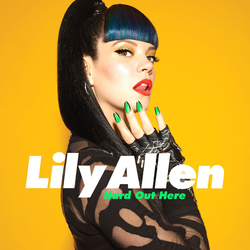
Yesterday, a young feminist asked my opinion of the music video for Lily Allen's "Hard Out Here."
In her email, she said she "chooses" to interpret the video as feminist, based on the song lyrics and reference to "sarcasm." Others she knows disagree. She asked for my two cents.
First, I had to confess that I hadn't seen the video and didn't know the song or the artist, feeling quite unhip and old. (Let me interject that we had previously discussed her love of Tarantino, particularly her favorite of his films, "Death Proof." I haven't seen the film, I confessed, then declared my general dislike of Tarantino's smug violence porn. I'd rather just watch porn porn, I told her. She laughed.)
But back to Lily Allen. Here is most of the email I sent:
The song/video is clearly intended as a liberal feminist declaration, reclamation of "bitch," and attack on the double-standard put on women pop singers: damned if you're sexy, damned if you're not. The video is intended to show what is wrong with the business.
The problem with ambiguity/dramatic irony in music videos (what she names "sarcasm" in the song) is that it can be interpreted both ways: critique and exemplification of sexism.
There's also the hypersexualization/exploitation of black women via this double-edged ambiguity, where a white woman can get away with (and/or parody) hypersexualization more easily than a black woman as white women aren't linked with "natural" hypersexualization as a racist trope.
I'm also convinced by this point in Prachi Gupta's review of the video in Salon on 11/13/13, where she argues that "the parody gets messy pretty quickly — pop music and hip-hop videos are already so over-the-top that it’s hard, if not impossible, for Allen to heighten the absurdity of the sexism at play in music."
Ultimately, to me, "Hard Out Here" is best described as an example of hegemonic negotiation, attracting the biggest audience possible and popular approval (23.5 million hits on YouTube as I type this) by being accessible as both/either feminist statement and/or fetishistic objectification, based on a viewer's perspective.
What do you think of this interpretation?
To the cherished few who read this post, I'd now love to know what you think.
In her email, she said she "chooses" to interpret the video as feminist, based on the song lyrics and reference to "sarcasm." Others she knows disagree. She asked for my two cents.
First, I had to confess that I hadn't seen the video and didn't know the song or the artist, feeling quite unhip and old. (Let me interject that we had previously discussed her love of Tarantino, particularly her favorite of his films, "Death Proof." I haven't seen the film, I confessed, then declared my general dislike of Tarantino's smug violence porn. I'd rather just watch porn porn, I told her. She laughed.)
But back to Lily Allen. Here is most of the email I sent:
The song/video is clearly intended as a liberal feminist declaration, reclamation of "bitch," and attack on the double-standard put on women pop singers: damned if you're sexy, damned if you're not. The video is intended to show what is wrong with the business.
The problem with ambiguity/dramatic irony in music videos (what she names "sarcasm" in the song) is that it can be interpreted both ways: critique and exemplification of sexism.
There's also the hypersexualization/exploitation of black women via this double-edged ambiguity, where a white woman can get away with (and/or parody) hypersexualization more easily than a black woman as white women aren't linked with "natural" hypersexualization as a racist trope.
I'm also convinced by this point in Prachi Gupta's review of the video in Salon on 11/13/13, where she argues that "the parody gets messy pretty quickly — pop music and hip-hop videos are already so over-the-top that it’s hard, if not impossible, for Allen to heighten the absurdity of the sexism at play in music."
Ultimately, to me, "Hard Out Here" is best described as an example of hegemonic negotiation, attracting the biggest audience possible and popular approval (23.5 million hits on YouTube as I type this) by being accessible as both/either feminist statement and/or fetishistic objectification, based on a viewer's perspective.
What do you think of this interpretation?
To the cherished few who read this post, I'd now love to know what you think.

 RSS Feed
RSS Feed
